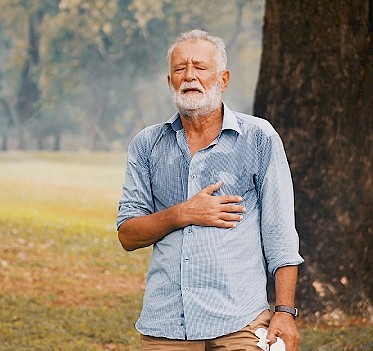Symptoms and Causes of Heat Strokes
The summer heat in the South and Midwest is no joke. High temperatures and humidity, especially when mixed with strenuous physical activity, are a recipe for heat exhaustion and heatstroke. These “strenuous activities” can range from gardening, and outdoor sports to a fun and relaxing beach day. Not everyone’s body handles heat the same. Without the proper treatment, heat exhaustion can lead to heatstroke, a life-threatening condition.
Heat exhaustion is a condition where heavy sweating and a rapid pulse is the result of your body overheating. It's one of three heat-related syndromes, with heat cramps being the mildest and heatstroke being the most severe.
Fortunately, heatstroke and heat exhaustion are preventable! So, let’s talk about how.
Heat Exhaustion Signs and Symptoms
Signs and symptoms of heat exhaustion may develop suddenly or over time, especially with prolonged periods of exercise. If you think you're experiencing heat exhaustion, then it’s crucial that you stop all activity and rest. You should move to a cooler place and drink cold water or a sports drink to help rehydrate yourself. If your symptoms worsen or if they don't improve within one hour, contact a doctor. If you are with someone showing signs of heat exhaustion, seek immediate medical attention if he or she becomes confused or agitated, loses consciousness, or is unable to drink. You will need immediate cooling and urgent medical attention if your core body temperature reaches 104 degrees or higher.
Possible heat exhaustion signs and symptoms include but are not limited to:
- Cool, moist skin with goosebumps when in the heat
- Heavy sweating
- Faintness
- Dizziness
- Fatigue
- Weak, rapid pulse
- Low blood pressure upon standing
- Muscle cramps
- Nausea
- Headache
Why the Body Reacts Dangerously to Heat
Your core, internal temperature is your body's heat combined with the given environmental heat. Your body needs to regulate a normal 98.6-degree temperature in the environmental heat. Your body knows how to regulate cold loss in hot weather, just as in cold weather, your body regulates heat loss. Sometimes the body fails to cool itself. In hot weather, your body cools itself mainly by sweating. The evaporation of your sweat regulates your body temperature. However, when you exercise strenuously or otherwise overexert in hot, humid weather, your body is not able to cool itself as efficiently. As a result, your body may develop heat cramps which is the mildest form of heat-related illness. Speedy treatment usually prevents heat cramps from progressing to heat exhaustion. You usually can treat heat cramps by drinking fluids or sports drinks like Gatorade, Powerade, Liquid I.V. and other drinks that contain electrolytes. Getting into cooler temperatures, such as an air-conditioned or shaded place, and resting is also another way to avoid heat exhaustion.
Besides hot weather and strenuous activity, other causes of heat exhaustion include:
- Dehydration, which reduces your body's ability to sweat and maintain a normal temperature
- Alcohol use, which can affect your body's ability to regulate your temperature
- Overdressing, particularly in clothes that don't allow sweat to evaporate easily
How To Know if You Are at Risk
Anyone can develop heat exhaustion, but certain factors increase your sensitivity to heat. You could be at risk for heat exhaustion for any of the following reasons:
Young or Old Age
Infants and children younger than 4 and adults older than 65 are at higher risk of heat exhaustion. The body's ability to regulate its temperature isn't fully developed in the young and may be reduced by illness, medications, or other factors in older adults.
Drug Use
Medications that affect your body's ability to stay hydrated and respond appropriately to heat include some that are used to treat high blood pressure and heart problems, to reduce allergy symptoms, medicines to calm you or reduce psychiatric symptoms such as delusions. Additionally, some illegal drugs, such as cocaine and amphetamines, can increase your core temperature
Obesity
Carrying excess weight can affect your body's ability to regulate its temperature and cause your body to retain more heat.
Sudden Temperature Changes
If you're not used to the heat, you're more susceptible to heat-related illnesses, such as heat exhaustion. Traveling to a warm climate from a cold one or living in an area that has experienced an early heat wave can put you at risk of a heat-related illness because your body hasn't had a chance to get used to the higher temperatures.
A High Heat Index
The heat index isa single temperature value that considers how both the outdoor temperature and humidity makes you feel. When the humidity is high, your sweat can't evaporate as easily and your body has more difficulty cooling itself, making you prone to heat exhaustion and heatstroke. When the heat index is 91 degrees or higher, you should take precautions to keep cool.
Prevention Heat Stroke
Luckily, there are many ways to protect yourself from experiencing heat illnesses. HealthCARE Express recommends that you:
- Wear loose fitting, lightweight clothing
- Wear sunscreen
- Drink plenty of fluids
- Take extra precautions with certain medications
- Never leave anyone in a parked car
- Take it easy during the hottest parts of the day
- Get acclimated and limit time exercising until your body adjusts
How Healthcare Express Can Help With Heat Stroke
If you or someone you know are experiencing persistent symptoms of heatstroke or heat exhaustion, visit our website to find a location closest to you and give HealthCARE Express a call. We have locations in Oklahoma, Texas, Arkansas, and Louisiana with healthcare professionals to assist you with your medical needs or concerns you may have. We are approaching the hottest time of the year in the Midwest, and our staff is dedicated to providing the best care for you and your family.
Return to Blog
